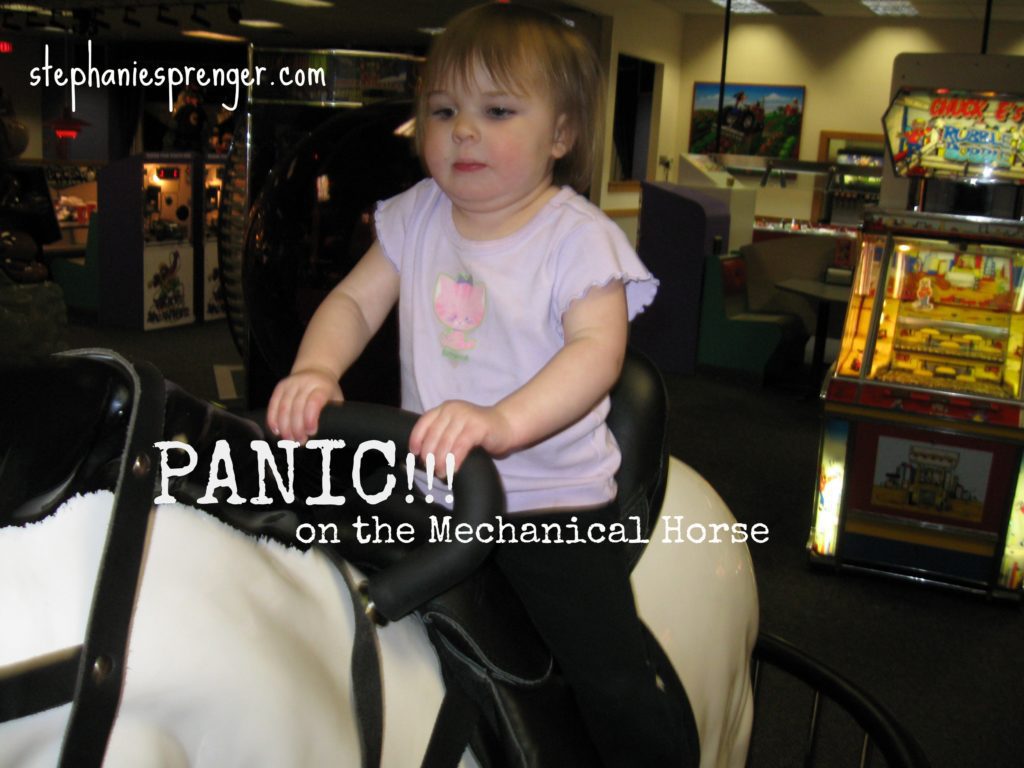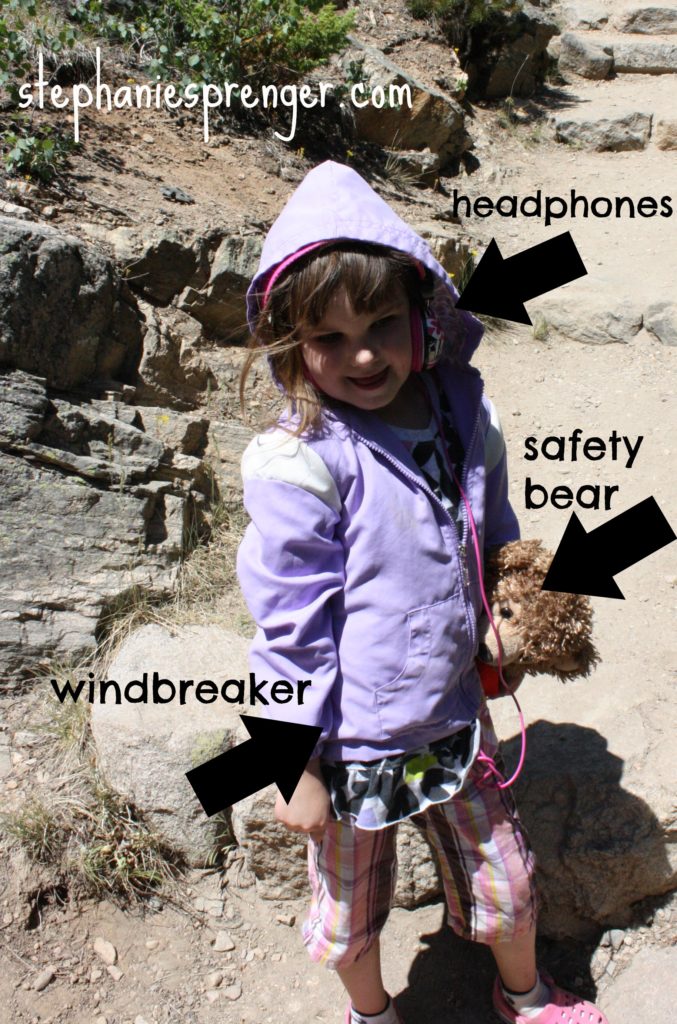When I was a kid, I thought that if I repeated the same made-up prayer every night, warding off every possible misfortune, that I might be able to prevent bad things from happening to me.
Please God, don’t let anyone in my family get sick and die, or get murdered or hurt by anyone. Please don’t let anyone break into our house. Please don’t let our house catch on fire.
Years later, I don’t remember all the addendums to this “prayer,” which was really more like a superstitious, paranoid mantra of sorts. But what I do remember was the anxiety.
I don’t believe this anxiety manifested outwardly at all; it did not interfere with my enjoyment of life, or my ability to make friends; it did not prevent my family from going on vacation, or road trips, or outings and errands. In fact, I don’t think my parents had any idea about my somewhat dysfunctional prayer. I doubt I ever told them that I sometimes had repetitive thoughts about bad things happening.
While I never experienced crippling anxiety or bouts of panic, there were times throughout my childhood years that I felt acutely out of place and anxious about who I might talk to at lunch, or what I might do at recess. Sometimes I would catch myself daydreaming during school; when I realized I hadn’t been paying attention and had no idea what was happening, I experienced a very unpleasant physiological response: heart pounding, face burning, quick breathing. (My therapist informed me years ago that when I experience this response even as an adult, it is described as becoming “activated.”)
I never really thought of myself as being an “anxious child,” even though I was prone to worrying. I performed vocal solos and served in leadership roles- how does that translate into anxiety? But it’s always been there- popping up every once in awhile from its home just below the surface of my psyche. After my first daughter was born, I experienced a combination of anxiety and irritability that my OB treated with a low dose of an anti-depressant. This took the edge off during those horrible failed naptimes when I could feel myself becoming “activated” once again as my infant daughter refused to settle in her crib.
Childhood Fears- What is Normal?
I suppose it shouldn’t have shocked me when my own daughter began to exhibit signs of anxiety. Certainly all children go through a period of fearfulness, and rightfully so. Determining which environments and characters are safe and familiar is a crucial part of child development. I remember when darling Uncle Brian, in a misguided attempt to relive a favorite childhood memory of ours, played a live version of Alice in Wonderland for an almost-two-year-old Izzy.
 She was terrified of adults dressed as rabbits for several years, (take a hike, mall Easter Bunny!) and would occasionally, during diaper changes, reenact the parts of the movie that most distressed her: “Go away dino! (The Jabberwocky) Alice skeeming! (screaming)”
She was terrified of adults dressed as rabbits for several years, (take a hike, mall Easter Bunny!) and would occasionally, during diaper changes, reenact the parts of the movie that most distressed her: “Go away dino! (The Jabberwocky) Alice skeeming! (screaming)”
When she was four, seemingly out of nowhere, she developed a fear of the wind. She became absolutely incapacitated during wind storms whenever we had to walk outside. We began to avoid public outings on excessively windy days, but we couldn’t avoid going into or out of the school building. On windy days, my own anxiety would resurface, as I imagined my daughter forced to go outside at recess.
One day, she ran into the building screaming, abandoning her class on the playground, and fortunately barreled straight into her kindergarten teacher. The school psychologist got involved, implementing a “safety strategy” with Izzy and trying to find a reward system that might motivate her. We learned that sometimes the support and distraction of peers helped her, but not always. We learned that when she was truly frightened, there was no point trying to “reward” her. We discovered that on the most turbulent of days, it was best for her to remain inside in a classroom of older children while the kindergarten class went to recess.
We made it through the school year with help from the psychologist, a session with an educational kinesthesiologist, and weekly sessions with a play therapist. Izzy used sand play as a method of working through some of her anxiety, and the therapist also worked with me and my husband to help us brainstorm some strategies for helping her to feel safe. The anxiety with the wind lessened over the next year, and eventually, the impact on our daily life was nonexistent, save for the occasional late night wind storm.
Tips for Helping an Anxious Child Cope
Looking back, it’s hard to say which of our efforts were the most instrumental; perhaps Izzy just grew out of that phase on her own. But being a control freak planner, it helped me to have a few strategies in place- who knows if we may need to break them out again at some point?
- Pinpoint triggers: With us, it was no mystery that the wind, wild birds, and loud environments like movie theaters and concerts caused Izzy to panic. It may not be so obvious with all children- keep a log of when your child is exhibiting anxiety and note all the sensory and environmental factors.
- Develop a strategy when your child is not “activated”: When our daughter was calm, we spoke objectively about her fear of the wind, discussed our family’s plans, and brainstormed a solution should it become windy while we were out. This was our protocol:
- If Izzy became frightened, we encouraged her to first voice her concerns as calmly as possible.
- We always brought a windbreaker with a hood, some headphones, and her “safety bear” when we went places- we brought them out during moments of crisis.
- We had a protocol for leaving places like the zoo in a hurry: zip up, cover ears, let Daddy hold you, and stay calm while we walk quickly to the car.
- We invented “the stroller bubble” for those transitions to and from school: Izzy would stand between my body and the stroller, and I put my arms on either side of her as I pushed the stroller through the parking lot.
- Examine your own anxieties and emotional struggles Are you dealing with stress at home? Have you had a major transition like a new job, baby, or home? Children are extremely sensitive and often pick up on subtle emotional cues that we aren’t even conscious we are projecting. Dealing with our own issues is always beneficial to our children.
- Get help Having an anxious child can be embarrassing or stigmatizing- especially when you have to pack up and bail on a special event or gathering. Don’t deal with it alone. Working with the play therapist and school psychologist was crucial for our family. We also benefitted from reading books- The Highly Sensitive Child by Dr. Elaine Aron, in particular.
I accept the fact that my daughter and I share a sensitive temperament and are both prone to anxiety. In our family, prioritizing emotional and mental health is central; while we are currently unaffected by episodes of anxiety, I know it is always possible that they will return. Being aware of this reality and staying prepared with some strategies does wonders for alleviating my own anxiety.
If your child is struggling with anxiety- you are not alone. Reach out and get help.
This has been a Finish the Sentence Friday post.
This week’s sentence was: “When I was a little kid, I thought….”
No FTSF next week for Halloween night!
The November 8th sentence is: “When it comes to my past relationships, my partner/spouse thinks…”
Your hosts:
Me
Janine at Janine’s Confessions of a Mommyaholic
Kristi at Finding Ninee
Kate at Can I Get Another Bottle of Whine?
Link up with us below, and share your favorite posts with #FTSF!












Seriously great tips here and I too had a bit of anxiety as a child and sometimes would see some nervous tendencies in Emma. Thankfully, I am seeing less and less of them in her as she is getting older now, but like you thought for sure she got some of it from myself. But seeing what you said here, I think it is more common then sometimes we even like to admit and appreciate you sharing your and Izzy’s dealing with this.
Thanks Janine! Hopefully Emma will continue to grow out of it!
Good tips! I was not a particularly anxious child, but my kids have different anxiety issues. My oldest is scared of “disasters” and therefore is afraid of fire drills, tornado drills, etc. She once had a bonafide panic attack after an unannounced fire drill and after the Sandy Hook tragedy – lets just say it was bad for a couple of weeks. My youngest has a big fear of bugs – like run away screaming fear. She used to be afraid of heights, but is overcoming that one. It is a tough thing to watch your kids so afraid and not be able to really help them!
Disasters are a HUGE trigger for Izzy. We try to keep the TV off during stressful news coverage weeks (aren’t they all?) but she does hear things at school. Whenever we travel to another state, she wants to know if they have tornadoes, earthquakes, or hurricanes. :/
Stephanie – I said almost the exact same prayers when I was a kid, and I wasn’t a particularly anxious child. I have one who is prone to it though, and it’s changed and evolved over the years. Sadly, her fears are real – anxiety over random acts of violence in schools and movie theaters – places that should be safe. Your suggestions are wonderful for younger children, but how can I help my teenager be less afraid of real albeit rare dangers? I tell her that she can’t let the fear stop her from living, or the bad people win. Ugh – it’s so hard. Sorry to ramble on; your post got me thinking!
I totally hear you, Dana- the “real” dangers are hard to dismiss. Even Izzy’s natural disaster worries could become a reality- we were very lucky that we weren’t affected by the CO floods- but we very easily could have been. The violence fears are even more disturbing. I have no idea how we will navigate this as she gets older; trying to instill some preparation and safety skills while not scaring the hell out of her will be no small task. :/
Wow. I thought I was alone in saying those awful prayers when I was a kid and well…yesterday…
It took me too many years (and a lot of amazing blogs, like yours), to realize that I’ve got anxiety. Weird, right? I just thought I was a freak. Not that I’m not but you know.
Really great post, Steph. As always. xoxo
I’m feeling less “freaky” reading your comment and Dana’s, too. Who knows how many kids have those type of prayers? Thanks for sharing that with me- it makes me feel better!
Oh this hits home. I was a curious mixture of being the class clown and an anxious Annie when I was little. My daughter took up that torch minus the class clown act and would worry about everything “Where will you stand while I play soccer, Mom?” “Will you get back from the hairdresser’s in time to pick me up from school?” etc. Both of us have eased out of the fears, thankfully.
Such wise, wise points you raise on dealing with the fears. Especially love the “stroller bubble.” Brilliant.
Oh, thank you so much, Kelly. I really appreciate that! Glad you have both eased out of it… hopefully we will, too!
Wow, wow, wow, I love this post! It’s like you’re describing me…and my daughter. I’ve had to confront how much my anxiety influences her own and let my husband take the lead in so many stressful situations. I actually went to a lecture last night on anxiety in children and the greatest take-away I got was how important it is for parents to push an anxious child into difficult situations in order to conquer anxiety. With tools, of course, like you described, and trying to hit that exact line of stressful-but-not-too-stressful. What a challenge this parenting thing is…
I wish I could have gone to that lecture! As I said, we are sort of on level ground right now, but I am not naive enough to think we won’t have struggles periodically. It is so hard to push them into those situations, isn’t it? I’m glad this post resonated with you!
Great suggestions, Stephanie! I love The Highly Sensitive Child book! {Have I mentioned how similar our daughters are?} I don’t think my daughter gets anxiety, but I she definitely gets “activated” – I love that description. And I think have a control freak/planner mom certainly helps Izzy a lot, because it provides her with a plan and with structure!
Maybe someday our sensitive gals will meet IRL! 😉 I like the word “activated” too, and I certainly hope Izzy outgrows some of the fears- she seems to have moved beyond many of them already. Thanks for the encouragement!
This were all really great tips. I especially liked that you included asking for help. I think that really scares some parents, and it is hard to do, but sometimes our help alone just isn’t enough.
Thanks for that, Heather! It can definitely be hard to ask for help- it’s sort of stigmatizing, but sometimes necessary. I appreciate your comment!
Thanks so much for this, Stephanie! My son and I are both sensitive/anxious people, and I am currently getting some help for him at school. We’ve identified some triggers and are now hoping to work on some strategies. It’s so great to have people who can help. I will check out that book, too.
I’m so glad this was helpful to you, Jessica! Thanks for your comment!
Thank you so much for the great tips! It is very likely this information will be needed in the future.
You’re very welcome! I hope you DON’T need them! 🙂
Why hello there, twin sister! We sound like similar kids…
And thank you for these helpful tips! I have a feeling my own child may have some of the same challenges, and I’ll remember these.
I’m not surprised to hear that… I knew you and I had a lot in common! 😉
I have noticed that our grandson prefers to have everyone in a room with him at one time. When he is playing in his sectioned off area of the living room everyone must be in that area, and if you are not and are in his line of sight he gets highly upset. We all of course take the break to play with him because he is just one and to let him know we are here. I really feel like a big part of it is due to his mother’s non desire to be around him and connect with him. We are his safety net and when we have to take him back to her he is inconsolable. It breaks my heart. Despite our best efforts to get her to interact she basically admits she only wants him because she wants money and attention. If he is getting her neither then she doesn’t want him around. Sighs.. I can only hope soon we can afford an attorney and get custody of him from her.
Oh, wow, that sounds like such a sad situation. I can imagine that must be so difficult for you. Hugs, and good luck!
Such a fascinating post, Steph. My own experiences of anxiety seem quite similar to yours – it was always something bubbling away just below the surface. Fantastic tip about developing a strategy when your child is not “activated”. So glad to hear that your daughter’s fear of the wind has lessened.
Thanks for your supportive comment- I appreciate it!
This is very interesting. I often wonder if I messed up Christopher with being scared of the dark. I played with him as a toddler, hid and said, “Boo” from the dark shadows of the house. He was always laughing, but when he was older and could talk he said, “Please don’t play that game”. I felt awful. He is scared of the pitch dark of his room but he’s fine after he’s sleep. If he goes to the bathroom in the middle of the night he usually leaves the light on though. Whenever we come home this time of year and everything is dark he is rushing to turn lights on. We pray for no bad dreams before he goes to sleep and he keeps my husbands dog tags under his pillow – that keeps him “safe”. 😉
Oh, poor baby! I’m sure you didn’t “mess him up”… 🙂 Funny how each kid has their own triggers and fears, huh?
I remember being anxious about not getting enough sleep at night when I was little. If I could hear the late news on I just knew I was going to be tired and I would completely stressed out. Such a small thing, but I remember it so vividly. Thanks for the great tips!
Oh, I did that too! Or if I woke up in the middle of the night, I’d stare at the clock and mentally calculate how many hours of sleep I would get if I’d fall asleep right NOW. Brutal.
So good, Stephanie. xoxo
Aw, thanks. xo
I never had actual anxiety beyond what one normally expect, but my son has clinical anxiety. Initially a psychologist was very helpful. Strategies were worked out and he did great. But as he turned 9-ish, it wasn’t enough. For about a year he had to be on medication. It helped a lot and since about 11, you’d think it isn’t even an issue…but every now and then it will pop out at you. I wish he and Izzy didn’t have to go through it. Blergh. –Lisa
I wish that, too. It makes me wonder what the years ahead hold for Izzy… Thanks for sharing your experience- I appreciate it!
That’s just so sad! There are a bazillion things that frighten kids that you can work around, like clowns, monsters under the bed, etc., but wind?? Wonder if she had a blow dryer mishap or something that sparked it initially? 🙁
I always wished I could pinpoint what started it, Chris. It remains a mystery…
OY. I could go on and on about my own struggles with anxiety, like how as a child I would vacuum my room obsessively to get myself to calm down and my heart rate to slow….how I would mentally chant the alphabet backwards to keep my mind off scary thoughts like how I thought the food I just ate was going to kill me…..I could go on and on…but I’ll stop there cuz you get the point.
both my boys have exhibited behavior that got my attention, but I waited…not wanting to be “hector projector” and assume it was anxiety. They are both extremely shy. But so far, neither have anxiety that’s required having to do anything extreme. We’ve been able to handle everything at home with strategies and such, more with my youngest than my oldest.
This is a great post! I’m so glad your little girl has been able to get past the aversion to wind. That’s a huge step! sounds like she has great parents. 🙂
Thank you so much for sharing, Beth. It’s been really helpful and interesting to hear other people’s experience with childhood anxiety. I am glad your kids are doing well!
I’ve never heard of a wind phobia…was it just storm winds or would a gentle summer breeze do the trick as well?
Once, we had to wake the kids and go downstairs because a tornado was literally about to descend upon the area. My daughter was sound asleep and the whole ordeal was, admittedly, a bit unnerving. She was really scared during storms for the longest time afterwards and is only now able to sleep through the night if she thinks it’s going to be stormy. I think a lot of kids outgrow these things, but it’s good to be aware of them. I always say that any of us are one or two traumatic life events from being certifiable. It’s luck of the draw sometimes that many people don’t ever display the symptoms that lurk just beneath their skin.
You are so right. When it was at its worst, even a mildly windy day upset her. Now it has to be a pretty bad windstorm at night for her to freak out.
omg…I think we were just synchronized commenting! If only it were an Olympic sport….
Ha! We kick ass.
as difficult as it was to have had your own experience with anxiety, your kids are way benefitted for that simple fact… anxiety is the state that no matter how well-meaning and loving a parent might be, if they haven’t been through it themselves, they cannot know.
in my own childhood, more persistent than my recollection of the anxiety events were ,y aggravation at hearing, ‘clark, there is nothing to be afraid of’
…they (who have not experienced it) never appreciate the difference between fear and anxiety.
..’good Post
Wow, Clark, thank you so much for that- it means a lot.
What a great article with lots of helpful tips. I hope other families with anxiety issues can tap into this blog.
PS I hardly recognized my Izzy on the horse with her chubby face! How I love her!
Thanks Mom… Hard to believe she is so big now!
Great post Stephanie! I can relate to this on so many levels. Being a Mom has made my anxiety come to the surface in a crippling way. I’m getting treatment for it now, and for the first time since becoming a Mom, I feel like I finally have a grip on how to deal with all the ups and downs life throws my way. Looking back, I can see that I was suffering as a child too. Just not as severely as when I became a Mom and had a lot more on my plate. It’s so hard to see some of those same things in my own children, but I think just being aware is number one.
Thank you so much for sharing your experience Meredith. Good for you- I agree that awareness is a huge first step!
Interesting post. When I was growing up, there was the “Be a Man” comment anytime fear was around. Of course, the teasing, “Scare-dee Cat, Scare-dee Cat” was also very common from others that made it more of a dare than an illness. I used the “What is there to be afraid of” method with my girls, and had them write down on paper what created fear in them. Usually, there was little to nothing on the paper, which allowed me to say, “If there’s nothing on paper, then there’s really nothing to be afraid of, right?” Next, we’d laugh about it and joke some to get smiles on their faces. I’d then give them the paper and told them the next time they were afraid, to pull it out and see there was nothing to it. I recognize that’s far from modern medicine, but, believe it or not, it really wasn’t tough love and it worked. Now, I’m not pushing that method on you, by any means. You’re doing what is best for your child and I applaud you for it. Great job!
Thanks for sharing your thoughts, Rich. I always appreciate your perspective.
Hey! We do headphones! Have we talked about that already? For Isaiah it’s just the noise. Any loud noise. We went out to dinner last night, when we first got there it was nice and quiet and everything was alright. An hour later it was hoppin’ and he started FREAKING OUT.
So I get, it’s awesome of you to share this!
Incredibly wise, perceptive and informative. You wouldn’t be surprised if I told you that the first part of your article is about me… I recognize everything you’ve described so well. The anxious childhood episodes- performing in front of the entire school as a drama major, at the same time feeling debilitated by social anxiety and inadequacy at times. The “hot flashes” that are letting you know you’re being activated. I learned so much from this and I’m going to read the book as I’ve been heartbroken over watching my son morph into me, terrified of not pleasing other kids, wounded by trivial exchanges between children and placing guilt on himself. Gosh, so much to read, so little time. This was Stephanie at her best, I love you for writing this.
Thanks for sharing this. I remember you mentioning Izzy’s anxiety, but didn’t know to what degree. She sounds like my son. We’re seeking help for him now. I’m going to look at that book you mentioned. Thank you!
Thank you so much for this, Stephanie. The headphone photo just gave me an idea for our upcoming trip. I’m anxious (of course I’m anxious) about my son’s anxiety spiking on the plane. Those headphones might help the situation.
Hi–
I found your link from the Sunday Parenting party and was drawn to the title. Looking back on my childhood, I now see how some of my actions and thoughts were signs of anxiety, and now I see some of that in my son. It really helps to know I’m not alone in this!
Thank you!
~Frantic Mama
Oh man. I want to wrap that child into my arms and make all of her anxiety go away. 🙁 We moved to and from Singapore 3 times in 3 years, and we lived apart from my dad for about a year during that time, and it caused me to develop massive issues with anxiety and OCD. But it went away once things settled down, and it only surfaces in times of high stress. It sounds like you have some great coping techniques with Izzy, and that it has kind of sorted itself out. And if it comes back, I know you’ll be able to deal with it. Izzy is lucky to have such awesome parents who are so on top of this!!!!
Wow, Stepahie, talk about taking on a problem head-on! I am SO impressed with all of the things that you have done for your daughter. You are a mama warrior! Thanks for linking up with the Sunday Parenting Party. This is an awesome post. I’m featuring it this week.
Thanks for writing this, Stephanie. My four-year-old is already in therapy for his anxiety (it runs on both sides of the family). It makes me sad that he’s in therapy already, but in a way I think moms like us should feel good that maybe our little ones will be able to break the cycle to some extent. It’s sad and scary.
Your post was really helpful to me (I featured you on the Sunday Parenting Party too).
🙂
Dawn- I really appreciate your feedback and also you featuring it in the Sunday Parenting Party. I’m sorry you are experiencing this also, but I’m glad this article was helpful to you!